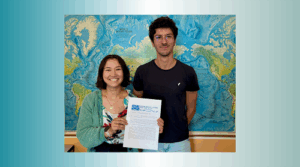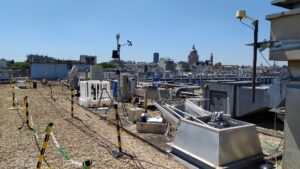PhD fellowship In Physical Oceanography
Assessing the evolution of marine heat waves in conjunction with ocean warming and induced variations in ocean stratification/vertical structure
Contexte
Subject description
The last two decades have seen a significant increase in the frequency and intensity of extreme weather events, including tropical cyclones, heat waves, heavy precipitation, and wildfires. The same is true for extreme events in the ocean, notably marine heat waves. These are part of a new and alarming trend in which we see the compounding effect of multiple extreme events occurring simultaneously or in succession, amplifying the collective impact and posing increasing challenges to human infrastructure and livelihoods around the world.
Extreme events and their linkages are a combination of synoptic atmospheric (weather) and ocean circulation and their linkage to climate drivers that result in potentially high-impact events. To mitigate and better adapt to compound extreme events, we need to better understand the phenomenology and evolution of these extremes in a changing climate. These events, and in particular, marine extreme events might be related to the observed ocean warming. In fact, terrestrial weather patterns and climate are determined by the amount and distribution of solar radiation incident on our planet.
To maintain a climate (statistical) equilibrium, the radiation leaving the Earth system towards space must equal the solar radiation absorbed, although numerous atmospheric, oceanic and terrestrial phenomena interact to couple these fluxes. Solar radiation can be diffused, reflected or absorbed by the atmosphere and the earth’s surface, then transformed into heat, latent, potential and kinetic energy, before being re-emitted to space in the form of long-wave radiation. This energy can be stored, transported and converted, generating various meteorological and oceanic phenomena. Today, this energy balance is being perturbed in unprecedented ways by human activities, with the ocean playing a central role in this disruption. More energy is entering the climate system as compared to the amount of energy leaving it. This unbalance is defined as the Earth Energy Imbalance (EEI). As a consequence, heat is accumulating in Earth climate. Most of this surplus heat is stored in the ocean, about 90%, and it is measured in terms of ocean heat content. The latest results indicate that global warming is accelerating (Minière et al., 2023; Storto et al., 2024).
This, potentially accelerating, ocean warming alters the vertical structure of the ocean inducing a stronger stratification of the upper layers and might favor the genesis, intensification and duration of Marine Heat Waves together with changes in atmospheric ocean circulation drivers (Oliver, 2019). Indeed, the surface temperature of the oceans has been rising, with extreme periods occurring more frequently over the past two decades. These are known as marine heat waves, or MHWs (Frölicher et al., 2018). We do not yet know the extent and depth of such events, nor do we know their connection to the atmosphere in terms of drivers and impacts. Nevertheless, these extreme warming events have been documented to have significant impacts on marine ecosystems (Smale et al., 2019; Smith et al., 2023), as well as on human well-being and regional economies (Holbrook et al., 2022).
In this PhD project, we will address this issue by focusing on the Atlantic Ocean which has been identified as one of the major regions of ocean warming (e.g., Cheng et al., 2023; Li et al., 2023) and where changes and extreme events have been observed to increase in frequency and intensity.
The candidate will work within the framework of the Europe Horizon2030 project ObsSea4Clim (Ocean observations and indicators for climate and assessments : https://obssea4clim.eu). One of the main focus of ObsSea4Clim is to assess MHWs and with this provide a better framework for observing and predicting actionable indicators for sustainable development and climate change adaptation.
PhD supervisor
Prof. Sabrina Speich (, https://www.lmd.ens.fr/speich/)
Laboratoire de Météorologie Dynamique – IPSL
École normale supérieure – PSL
45 rue d’Ulm
75231 Paris Cedex 05, France
Co-supervisor
Dr. Karina von Schukmann (Mercator Ocean International, Toulouse: )
Description
The objectives are to:
- Analyze critical areas of regional heat accumulation and changes in stratification as well as MHWs impacted areas under global warming.
- Identify the most critical areas (e.g., structure of the ocean circulation, modes of internal climate variability, synoptic atmospheric circulation) how heat is redistributed into the deep ocean layers, and how this has changed the vertical ocean stratification.
- Understanding the regional development of MHW processes and deciphering how they have changed with ocean warming and stratification, as well as with synoptic atmospheric circulation and climate variability (on interannual and interdecadal scales).
The questions to be addressed are:
- What are the elements of the regional ocean system that are changing?
- Are there key ocean processes that can explain the observed behavior?
- What are the respective roles of the ocean warming and atmosphere circulation and their interactions in a warming climate in the observed changes in MHWs?
- What role do MHWs play in overshooting the 1.5°C global warming threshold?
- Do current climate models correctly represent these phenomena? What do large ensembles of climate simulations tell us about the processes in point (b)?
Indicative work program
- Careful characterization of regional ocean warming and marine heat waves based on analysis of historical data from observations and reanalyses. We will focus on the Atlantic Ocean.
- Composite study of periods of ocean warming, stratification and marine heat waves.
- Analysis of CMIP6 model results using the methods defined in (1) and (2).
- At the end of the thesis, based on the results obtained, we will be able to design sensitivity experiments using the IPSL global climate model.
The working environment
The École normale supérieure (ENS: https://www.ens.psl.eu/en) is home to 800 researchers and lecturers, 300 post-doctoral researchers and 600 doctoral students. It hosts 32 research units in the humanities and sciences, covering a very broad scientific field at the highest international level. As part of the Université Paris Sciences et Lettres, the École normale supérieure promotes fundamental research that expands the frontiers of knowledge while facilitating and encouraging its exploitation. Its research is structured in a dynamic way to anticipate and support the latest developments in the most advanced fields of science and to promote multidisciplinary initiatives. Strong research and attractive study programmes attract researchers and students from around the world. With new knowledge and new perspectives, the Ecole normale supérieure contributes to a better future.
The Laboratoire de Météorologie Dynamique (LMD: https://www.lmd.ipsl.fr/en/home-2/) studies climate, planetary atmospheres and the ocean by combining theoretical approaches, instrumental developments for observation and numerical modelling. It is at the forefront of research on the dynamic, physical and biogeochemical processes enabling the study of the evolution and forecasting of ocean, meteorological and climatic phenomena. The LMD is clearly positioned both on fundamental research on the processes, dynamics and biogeochemistry of the ocean, atmosphere and climate, and on finalized research, particularly on questions relating to the anticipation of global warming and its consequences.
The LMD has an interdisciplinary width that includes marine biology, marine chemistry, oceanography, and experts on the dynamics and physics of the atmosphere. Our scientists and students often have prominent roles in international project, from Antarctica, Arctic, and the great world seas, atmosphere and climate.
Contact information
If you have any questions about the position, please contact Prof Sabrina Speich
Application
Submit your application by email to
The application should be sent in French or English and contain:
- A one page cover letter outlining your ambitions for the outlined position and relevance to
the position description must be included. - ID
- CV
- Copy of diplomas
Applications must be received by: 2024-07-25
Information for International Applicants
Choosing a career in a foreign country is a big step. Thus, to give you a general idea of what we and Paris have to offer in terms of benefits and life in general for you and your family/spouse/partner please visit: https://www.ens.psl.eu/en/campus-life-paris
The ENS works actively to achieve a working environment with equal conditions, and values the qualities that diversity brings to its operations.
Salaries are set individually at the ENS.
In connection to this recruitment, we have already decided which recruitment channels we should use. We therefore decline further contact with vendors, recruitment and staffing companies.
References
- Frölicher, T. L., Fischer, E. M. & Gruber, N. Marine heatwaves under global warming. Nature 560,
360–364 (2018) - Hansen, J.E., , Makiko Sato, Leon Simons, Larissa S Nazarenko, Isabelle Sangha, Pushker
Kharecha, James C Zachos, Karina von Schuckmann, Norman G Loeb, Matthew B
Osman, Qinjian Jin, George Tselioudis, Eunbi Jeong, Andrew Lacis, Reto Ruedy, Gary
Russell, Junji Cao, Jing Li, Global warming in the pipeline, Oxford Open Climate
Change, Volume 3, Issue 1, 2023, kgad008, https://doi.org/10.1093/oxfclm/kgad008 - Holbrook, N. J. et al. Impacts of marine heatwaves on tropical western and central Pacific Island
nations and their communities. Glob. Planet. Change 208, 103680 (2022). - IPCC, 2021 : Summary for policymakers. In Climate Change 2021: The Physical Science Basis.
Contribution of Working Group I to the Sixth Assessment Report of the
Intergovernmental Panel on Climate Change (eds Masson-Delmotte, V. et al.) 3–32
https://doi.org/10.1017/9781009157896.001 (Cambridge University Press, 2021). - Li, Z., England, M.H. & Groeskamp, S. Recent acceleration in global ocean heat accumulation by
mode and intermediate waters. Nat Commun 14, 6888 (2023).
https://doi.org/10.1038/s41467-023-42468-z - Loeb, N. G. et al. Satellite and ocean data reveal marked increase in Earth’s heating rate. Geophys.
Res. Lett. 48, e2021GL093047 (2021). - Minière, A., von Schuckmann, K., Sallée, JB. et al. Robust acceleration of Earth system heating
observed over the past six decades. Sci Rep 13, 22975 (2023).
https://doi.org/10.1038/s41598-023-49353-1 - Oliver, E.C.J. Mean warming not variability drives marine heatwave trends. Clim Dyn 53, 1653–
1659 (2019). https://doi.org/10.1007/s00382-019-04707-2 - Raghuraman, S. P., Paynter, D. & Ramaswamy, V. Anthropogenic forcing and response yield
observed positive trend in Earth’s energy imbalance. Nat. Commun. 12, 4577 (2021).
Smale, D. A. et al. Marine heatwaves threaten global biodiversity and the provision of ecosystem
services. Nat. Clim. Change 9, 306–312 (2019). - Smith, K. E. et al. Biological Impacts of Marine Heatwaves. Annu. Rev. Marine Sci. 15, 119–145
(2023). - Storto, A., Yang, C. Acceleration of the ocean warming from 1961 to 2022 unveiled by largeensemble
reanalyses. Nat Commun 15, 545 (2024).
Compétences requises
Student profile
We are seeking a highly motivated candidate with a Master’s degree in physical oceanography,
atmospheric sciences, or a related field. Applicants from physical or mathematical disciplines
with an interest in climate science are also welcome.






